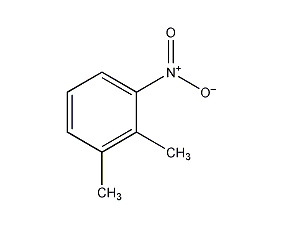
Structural formula
| Business number | 01TU |
|---|---|
| Molecular formula | C8H9NO2 |
| Molecular weight | 151.16 |
| label |
2,3-Dimethylnitrobenzene, 3-Nitro-o-xylene, 1,2-Dimethyl-3-nitrobenzene, 3-nitro-1,2-xylene, 3-Nitro-o-xylene, 1,2-Dimethyl-3-nitro-benzene, 1,2-Dimethyl-3-nitrobenzene, 2,3-Dimethyl-1-nitrobenzene, 1,2-Dimethyl-3-nitro-benzene, (CH3)2C6H3NO2, (CH3)2C6H3NO2 |
Numbering system
CAS number:83-41-0
MDL number:MFCD00007162
EINECS number:201-474-3
RTECS number:None
BRN number:2045105
PubChem number:24869555
Physical property data
1. Properties: yellow oily liquid [1]
2. Melting point (℃): 7~9[2]
3. Boiling point (℃): 245[3]
4. Relative density (water=1): 1.14[4]
5. Relative vapor density (air = 1): 5.22[5]
6. Octanol/water partition coefficient: 2.83[ 6]
7. Flash point (℃): 107.78[7]
8. Solubility: insoluble in water, soluble in ethanol. [8]
Toxicological data
1. Acute toxicity No data available
2. Irritation No data available
Ecological data
1. Ecotoxicity No data available
2. Biodegradability No data available
3 .Non-biodegradability No information available
4. Other harmful effects[9] This substance is harmful to the environment and should be treated with special Pay attention to water pollution.
Molecular structure data
1. Molar refractive index: 42.44
2. Molar volume (cm3/mol): 133.8
3. Isotonic specific volume (90.2K ): 338.0
4. Surface tension (dyne/cm): 40.7
5. Polarizability (10-24cm3): 16.82
Compute chemical data
1. Reference value for hydrophobic parameter calculation (XlogP): None
2. Number of hydrogen bond donors: 0
3. Number of hydrogen bond acceptors: 2
4. Number of rotatable chemical bonds: 0
5. Number of tautomers: none
6. Topological molecule polar surface area 45.8
7. Number of heavy atoms: 11
8. Surface charge: 0
9. Complexity: 153
10. Number of isotope atoms: 0
11. Determine the number of atomic stereocenters: 0
12. Uncertain number of atomic stereocenters: 0
13. Determine the number of chemical bond stereocenters: 0
14. Uncertain number of stereocenters of chemical bonds: 0
15. Number of covalent bond units: 1
Properties and stability
1. Stability[10] Stable
2. Incompatible substances[11] Strong oxidizing agent, strong alkali
3. Conditions to avoid contact[12] Heating
4. Polymerization hazard[13] No polymerization
5. Decomposition products[14] Nitrogen oxidation Object
Storage method
Storage Precautions[15] Store in a cool, ventilated warehouse. Keep away from fire and heat sources. Keep container tightly sealed. They should be stored separately from oxidants, alkalis, and food chemicals, and avoid mixed storage. Equipped with the appropriate variety and quantity of fire equipment. The storage area should be equipped with emergency release equipment and suitable containment materials.
Synthesis method
Originated from nitration of o-xylene. Cool the o-xylene to -10°C, and add pre-cooled mixed acid (made of 1 part 66% nitric acid and 2 parts 98% sulfuric acid) dropwise with stirring. Control the dropping temperature at -10~-5°C. After the addition is completed, continue stirring for 0.5h. Leave to stand and separate the waste acid from the lower layer. Take the nitration solution from the upper layer and wash it with water, 5% sodium hydroxide solution and water in sequence. Then perform steam distillation first, and then fractionate to obtain 3-nitro-o-xylene. Yield 50%.
Purpose
1. Used as plasticizer, chemical intermediate, and used in organic synthesis. [16]

 微信扫一扫打赏
微信扫一扫打赏

